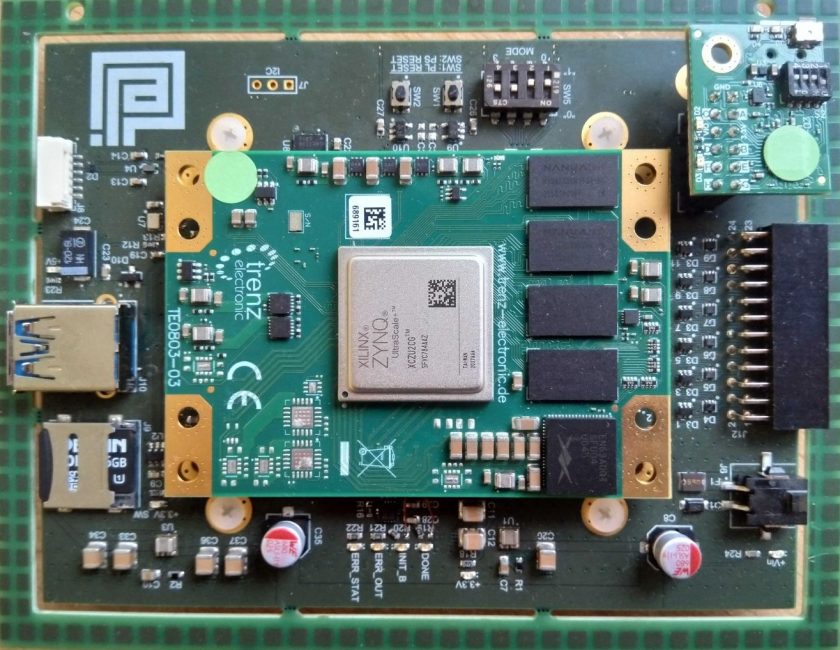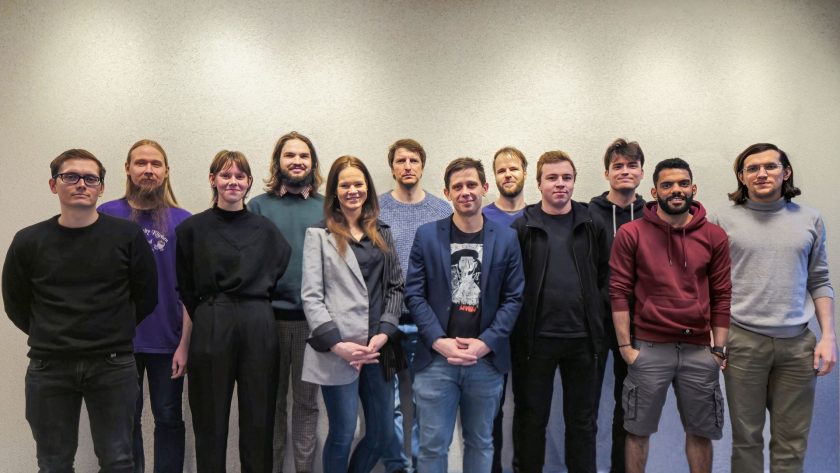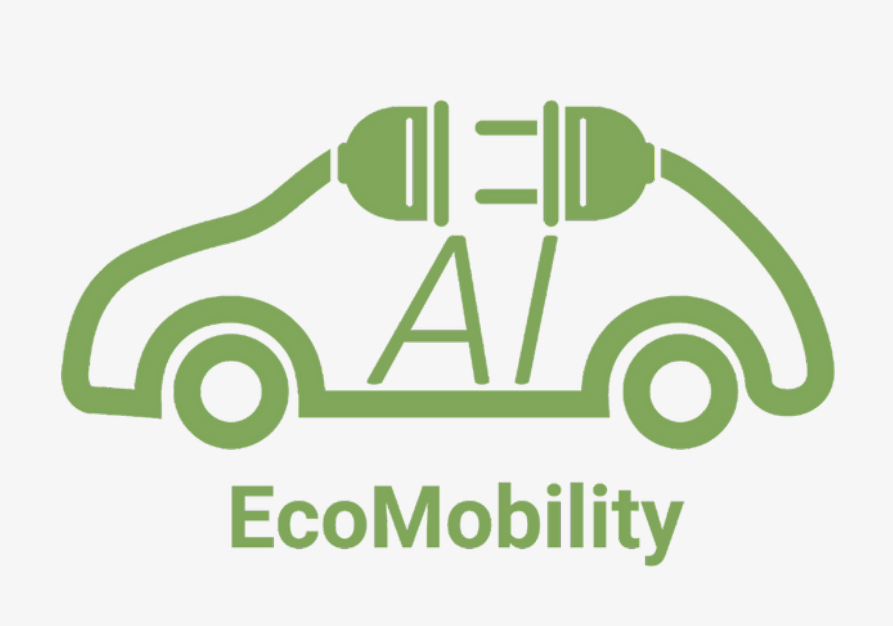
ICS Laboratory excels in high-performance and real-time signal processing, digital circuit design, development of novel sensor technology, heterogeneous single-chip systems, embedded systems for computer vision, development of machine learning algorithms, on-chip architectures, development of operating systems, etc.
Our vision is to build transformative, widely adopted semiconductor technologies that enable innovative industries while facilitating a core value of unlocking the potential of each individual.
We believe that by advancing research and investing in integrated circuits and systems, we will be able to create new approaches to computing, thereby ensuring sustainable societal development and simultaneously strengthening the institute’s and Latvia’s competitiveness globally.
Laboratory Team
 (from left side) E.Lielāmurs, A.Cvetkovs, K.Tupule, M.Pakalns, L.Greiškāne, A.Bizuns, R.Novickis, M.Celitāns, M.Meļņiks, N.Nadziņš, I. Sayed, S.Umnovs
(from left side) E.Lielāmurs, A.Cvetkovs, K.Tupule, M.Pakalns, L.Greiškāne, A.Bizuns, R.Novickis, M.Celitāns, M.Meļņiks, N.Nadziņš, I. Sayed, S.Umnovs
Long-term high-level goals of the laboratory:
- Invest in human capital, attract new talents and develop research excellence to promote world-class competence in the field of semiconductor devices and transform Latvia’s high-tech sector;
- Create innovations that exceed existing standards in microchip technologies, thereby contributing to the growth of the European innovation and research ecosystem and indicating new directions in scientific progress.
Hardware-accelerated quantum sensor prototype for magnetic field measurement displayed at EFECS2024 and developed collaborativelly with FAU and Arquimea Research. (A-IQ Ready)
FPGA-based infrared image pre-processing and IR/RGB registration prototype. (APPLAUSE)
360-degree full-surround Time-of-Flight perception system for slow speed automotive use cases.
Research directions:
- Development of the next generation sensors
The ability to perceive is a core element of almost any cyber-physical system. Furthermore, new sensing capabilities can significantly improve future technologies’ reliability, safety and functionality. However, obtaining such sensing modalities is a complex task requiring cross-domain expertise. These next-generation sensors often require a particular approach to data processing, achievable by developing specialized silicon hardware (chip) solutions.
Our proposition is grounded in our unique, difficult-to-pick-up skills (digital circuit design, digital signal processing, low-level programming, and System-on-Chip devices). Consequently, with our long-term skill investments, we wield a set of technological abstractions well-suited for developing new State-of-the-Art sensors. Our expertise in digital circuit design and on-chip architectures permits us to establish sensor control and data pre-processing at a very low level, while our system and application-level embedded software expertise enables us to increase technology readiness level while providing efficient interfacing for real-world applications. Accordingly, we have established cooperation with physicists, who are skillful at wielding basic physical phenomena to develop sensing capabilities. We complement their skills by further advancing the technology and integrating it into a variety of use cases, basically bridging the gap towards the industry.
Over the years, we have designed and developed different perception systems, including stereo depth cameras, 360-degree surround Time-of-Flight camera-based system, control and pre-processing for a low-cost infrared camera, with our latest being the development of a quantum sensor for magnetic field measurement. The sensor is complex. It incorporates analogue electronics for generating and sampling microwaves, digital electronics for pre-processing and control, and application-level software for users.
- Artificial Intelligence in Heterogeneous Single-Chip Systems
Our active involvement in machine vision research, combined with expertise in microchip digital circuits design, provides the necessary foundation for the developing artificial intelligence accelerators. The interpretation of large volumes of structured and unstructured data has become integral in modern information technology. However, traditional von Neumann architecture struggles to efficiently handle the computational demands of machine learning algorithms.
To address this, heterogeneous single-chip systems enable the integration of AI-optimized computing directly into silicon hardware. Leveraging the latest advancements in machine vision, our laboratory develops digital computing circuits within single-chip systems, achieving ultra-low-power, real-time machine learning capabilities. Our customized Neural Processing Units (NPUs), implemented in reconfigurable FPGA fabric, solve unique challenges such as Spiking Neural Network (SNN) acceleration.
This low-power, high-efficiency approach to large-scale data interpretation has significant applications in battery-operated devices, including drones, mobile robotics and electric vehicles. We are developing advanced algorithms to process transient data from emerging vision technologies, including event cameras, next-generation MIMO radars and ToF sensors. Our aim is to enhance the intelligence of next-generation vision sensor systems.
- Computing accelerators and their integration
The ability to implement algorithms in digital logic gives a unique opportunity to improve almost any modern technology. However, the development of silicon hardware solutions is relatively more expensive than conventional software development, as it requires more extensive training of specialists, prolonged technology development and testing cycles, and the need to integrate the technology with the rest of the system. The laboratory manages a variety of technological abstractions, including electronics design, digital circuit design, operating system engineering, driver development, software development, algorithm creation and even complete system design. These skills give the unique opportunity for accelerator transfer to the industry. Therefore, the ICS laboratory maintains a solution for integrating accelerators into technologies based on conventional hardware (more information: https://www.edi.lv/en/solutions/silhouse-accelerate-your-computer-vision-solution/).
Key words
– development of novel sensors
– signal processing
– smart sensors
– embedded intelligent systems
– digital circuits
– acceleration
– parallel data processing
– real-time
– HSoC, SoC, FPGA
– quantum sensing
Recent projects
-
 Go IT! #Horizon Europe
Go IT! #Horizon Europe
-
 Intelligent, Safe and Secure Connected Electrical Mobility Solutions: Towards European Green Deal and Seamless Mobility (EcoMobility) #ChipsJU
Intelligent, Safe and Secure Connected Electrical Mobility Solutions: Towards European Green Deal and Seamless Mobility (EcoMobility) #ChipsJU
-
 Artificial Intelligence using Quantum measured Information for realtime distributed systems at the edge (A-IQ Ready) #ChipsJU
Artificial Intelligence using Quantum measured Information for realtime distributed systems at the edge (A-IQ Ready) #ChipsJU
-
 Trusted lifetime in operation for a circular economy (ARCHIMEDES) #ChipsJU
Trusted lifetime in operation for a circular economy (ARCHIMEDES) #ChipsJU




